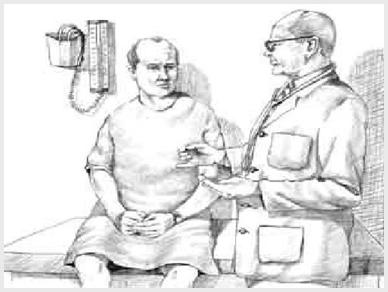









|
IRRITABLE BOWEL SYNDROME
What I need to know about Irritable Bowel Syndrome
On this page:
= What is IBS? = What are the symptoms of IBS? = How is IBS diagnosed? = What is the treatment? = Points to Remember = Glossary How is IBS diagnosed?
Medical Test for IBS
* Physical Examination
* Blood tests
* X ray of the bowel: This x-ray test is called a barium enema or lower GI (gastrointestinal) series. Barium is a thick liquid that makes the bowel show up better on the x ray. Before taking the x ray, the doctor will put barium into your bowel through the anus.
* Endoscopy: The doctor inserts a thin tube into your bowel. The tube has a camera in it, so the doctor can look at the inside of the bowel to check for problems
|

|
Diagnosis:
If a person has symptoms that suggest a brain tumor, the doctor may perform one or more of the following procedures: · Physical examination · Neurologic exam · CT scan · MRI · Angiogram |
|
What are the symptoms of IBS?
The main symptoms of IBS are : * crampy pain in the stomach area (abdomen) * painful diarrhea or constipation Most people have either diarrhea or constipation, but some people have both.
Other symptoms are : * mucus in the stool |
|
What is IBS?
Irritable bowel syndrome, or IBS, is a problem that affects mainly the bowel, which is also called the large intestine. The bowel is the part of the digestive system that makes and stores stool. The word syndrome means a group of symptoms. IBS is a syndrome because it can cause several symptoms. For example, IBS causes cramping, bloating, gas, diarrhea, and constipation.Click here to add text.
IBS is not a disease. It's a functional disorder, which means that the bowel doesn't work as it should. With IBS, the nerves and muscles in the bowel are extra-sensitive. For example, the muscles may contract too much when you eat. These contractions can cause cramping and diarrhea during or shortly after a meal. Or the nerves can be overly sensitive to the stretching of the bowel (because of gas, for example). Cramping or pain can result. add text.
Foods that tend to cause symptoms include milk products, chocolate, alcohol, caffeine, carbonated drinks, and fatty foods. In some cases, simply eating a large meal will trigger symptoms.
Women with IBS often have more symptoms during their menstrual periods.
What is the treatment?
IBS has no cure, but you can do things to relieve symptoms. Treatment may involve : Medicine, Diet changes and stress relief You may have to try a combination of things to see which works best for you.
Points to Remember
* IBS is a functional disorder in which the bowel doesn't work as it should. * IBS can cause cramping, bloating, gas, diarrhea, and constipation. * IBS doesn't damage the bowel. * The doctor will diagnose IBS based on your symptoms. You might have some medical tests to rule out other diseases. * Stress doesn't cause IBS, but it can trigger symptoms. * Fatty foods, milk products, chocolate, caffeine, carbonated drinks, and alcohol can trigger symptoms. * Eating foods with fiber and eating smaller meals can reduce symptoms. * Treatment for IBS may include medicine, stress relief, or changes in eating habits. Glossary
Abdomen (AB-doh-men): The area of the stomach.
Barium enema (BAR-ee-um EN-uh-muh): An x ray of the bowel using a liquid called barium to make the bowel show up better. This test is also called a lower GI (for gastrointestinal) series.
Bowel: The part of the digestive system that makes and stores stool. It is also called the large intestine.
Endoscopy (en-DAH-skuh-pee): A test to look at the inside of the bowel.
Functional: Refers to how something works.
Mucus: A clear, sticky discharge. It might look white.
Syndrome (SIN-drome): A group of symptoms. |
|
TOP |